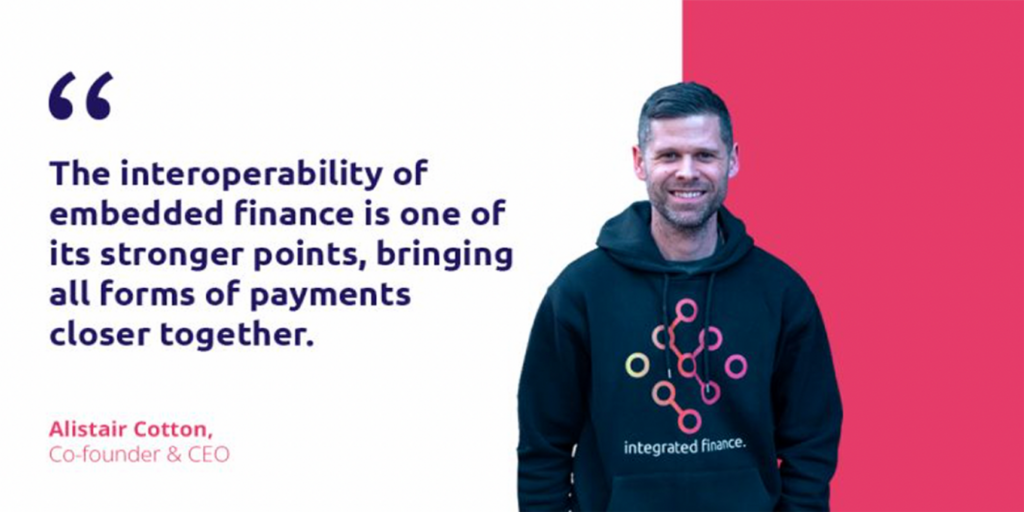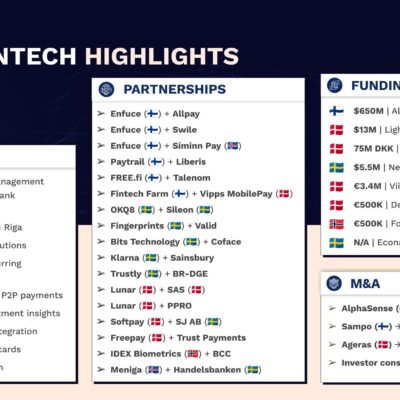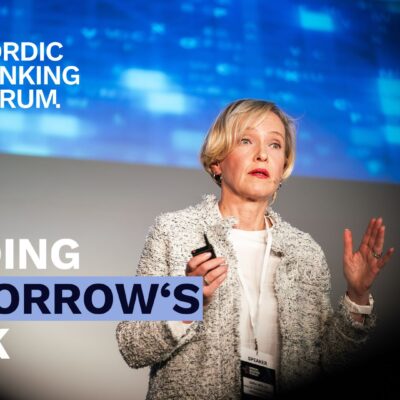As we move further and further away from the global pandemic, new tech booms and pitfalls are bringing interesting changes to the financial industry.
Let’s take a look at six Fintech trends that are bound to change the way we transact, embed, and grow in 2023.
1. Finance becoming more embedded
Embedded finance is big money; Juniper Research puts it at a market size of $138 billion in 2026. If you haven’t heard of it yet, embedded finance allows you to seamlessly integrate financial services into non-financial applications or platforms.
In an interview with Fintech Intel, Integrated Finance’s co-founder, Alistair Cotton, had this to say about embedded finance:
One thing about embedded finance is its interoperability. I think embedded finance will bring all forms of payments closer together, including digital currencies.
Cards, open banking, crypto, or however you want to pay for something, it will be available to you. And there will be multiple embedded finance players coming together to offer that unified service.
2. Open banking
Businesses are changing their offerings to align with consumer needs, and open banking is at the front of this new revolution. The open banking market was valued at $13.9 billion in 2020 and is set to reach a high of $123.7 billion by 2031. In the UK alone there are 7 million active open banking users. Those are staggering numbers – with big numbers, comes big growth.
There is still a long way to go as the full potential of APIs with open banking has yet to be fully realised.
3. RegTech
As we continue to an almost all-digital financial age, regulators are scrutinising more Fintech companies to adhere to local laws and regulations. According to Reuters, more than two-fifths of Global Systemically Important Banks (G-SIBs) have spoken to their local regulator about Fintech and RegTech solutions.
This means we’re going to see the growth of RegTech – automated solutions that combine data analytics, cloud technology, and machine learning and achieve financial compliance. This will enable companies to operate safely and efficiently while greatly identifying any legal risks to their operations.
4. Financial Conduct Authority compliance & ESG
More payment companies will adhere to stricter compliance standards. In a letter issued on the 16th of March, the Director of Payments & Digital Assets at the Financial Conduct Authority, Matthew Long, wrote to nearly 300 payment providers about unacceptable risks to consumers and the financial system.
However, we remain concerned that many payments firms do not have sufficiently robust controls and that as a result, some firms present an unacceptable risk of harm to their customers and to financial system integrity.
We consider that the risk of customer harm is heightened by the tightening economic conditions and the cost-of-living crisis. – wrote Long.
The letter goes on to outline several security practices that must be implemented:
- Safeguarding
- Prudential Risk management
- Wind-down planning
The entire industry is likely to suffer if companies fail to follow anti-money laundering (AML), Know Your Customer (KYC) and safeguarding protocols.
Financial layers are interconnected and sooner or later a domino effect can easily occur. Industry risk perceptions can cause commercial banks to sever ties with financial institutions, leading to the de-banking of other companies.
Lastly, the FCA’s decisive actions on non-compliance, such as issuing strong warnings and imposing penalties, further emphasise the need for businesses to prioritise ESG considerations in their operations.
5. De-risking the banking supply chain
From Railsr, once valued at close to $1 billion, in bankruptcy protection to the collapse of Silicon Valley Bank, and more, there’s no denying that there have been a lot of setbacks in the Fintech sector of late. Key figures in the US Congress are calling for stricter regulations for the financial industry.
Building in redundancy is crucial as it allows businesses to effectively react and adapt to changes in the market and helps them benefit from greater coverage during growth. In an interview with Fintech Finance News co-founder and COO of Integrated Finance, Daniel Cronin referenced redundancy as “Plan B” both in good and in bad times.
Redundancy is the Plan B; in good times, this translates to having the best offerings from multiple sources, allowing a Fintech company to maximise efficiency and performance. In bad times, redundancy becomes a matter of survival. If a business relies solely on one supplier (e.g. a banking partner) for its critical infrastructure and that supplier fails, the business will suffer. However, having multiple suppliers ensures that a business can survive, even if the transition is painful.
There’s no doubt that a harsh spotlight will be shone on the financial sector in 2023 as banks and businesses scramble to avoid more legislation while appeasing governmental bodies.
6. Artificial Intelligence
AI is the hot topic right now and it’s a subject that’s flooding news headlines and LinkedIn posts. It was spurred by the release of ChatGPT, the AI war between Microsoft and Google, and the ethics of AI art generation – all within the first few months of 2023.
So far, there haven’t been any significant AI announcements related to the financial industry, but you can be sure that they’re coming before the end of the year. Don’t be too surprised if you see this new wave of parameters and machine learning being implemented into chatbots, market predictions, and fraud detection.
AUTHOR

Integrated Finance was established by the founding team of a UK-based BaaS business and is the outcome of first-hand experience of the pain of integrating and stitching together a vast landscape of financial banking providers and partner connections.
Thus, their cloud-native, financial infrastructure platform allows fintechs to access on-demand core financial services and integration workflows, designed to accelerate time to value.
Want to hear more? Join us on May 11th in Helsinki to explore the next chapter in banking and finance!



